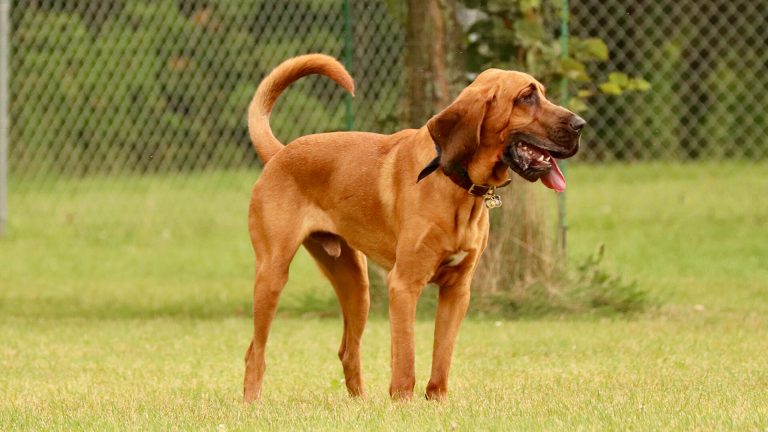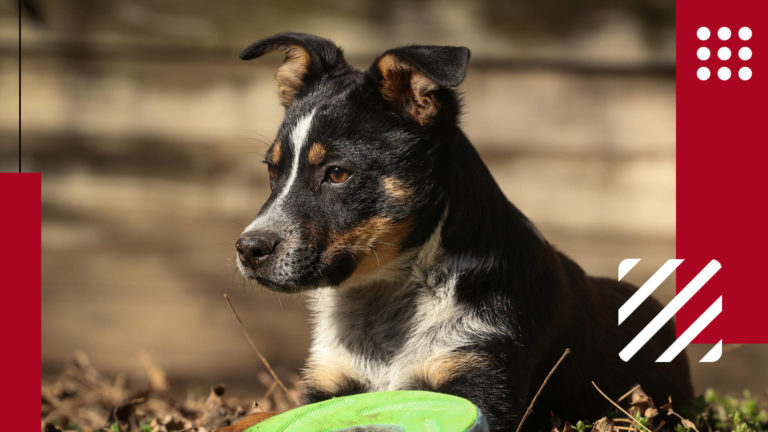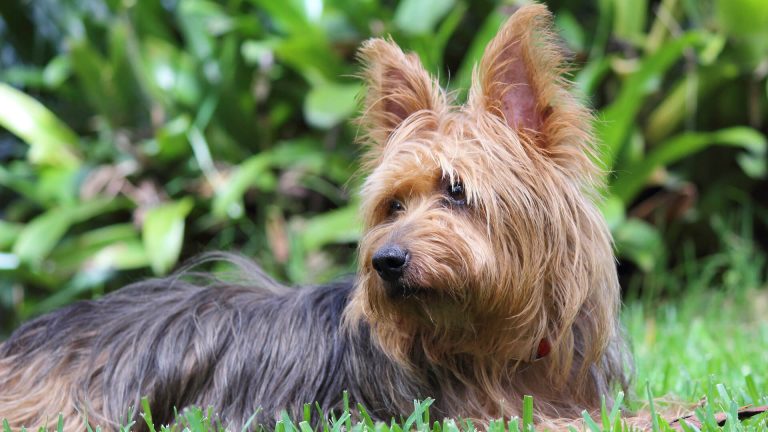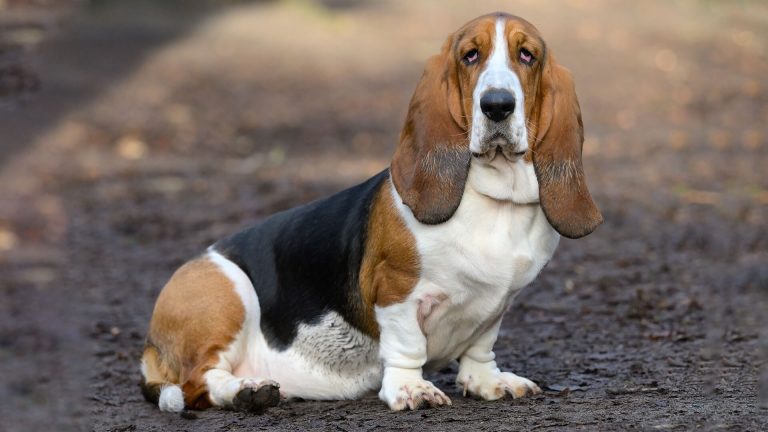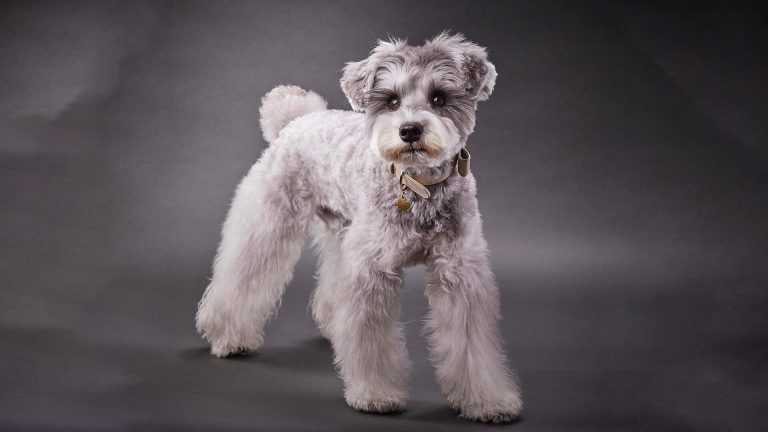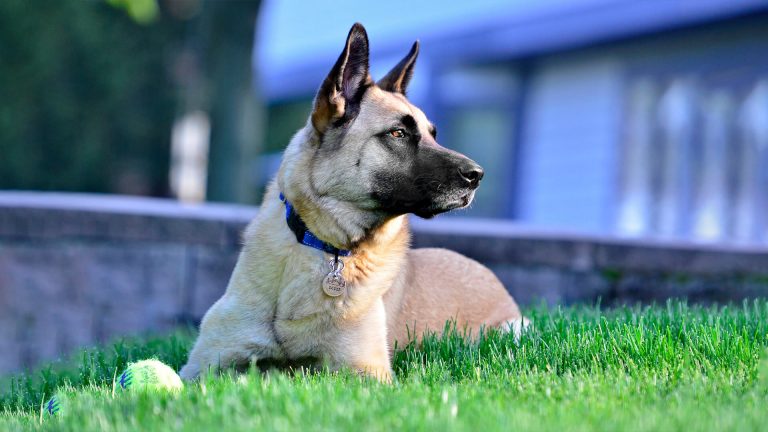The Bernese Mountain Dog is a breed of large working dog that originates from the canton of Bern in Switzerland. They were originally bred to be farm dogs, working as draft animals, driving cattle, and guarding the farm. The breed is known for its striking tricolor coat, which is typically black with white markings on the chest and legs, and rust-colored markings on the face, legs, and tail.
Bernese Mountain Dogs are intelligent, loyal, and good-natured dogs that are well-suited to life as a family pets. They are known to be affectionate and gentle with children and make great companions for active families. In addition to their work on the farm, Bernese Mountain Dogs have also been used as search and rescue dogs and as therapy dogs.
Distinctive Features of Bernese Mountain Dog
| Breed Name | Bernese Mountain Dog |
| Lifespan | Up to 10 years |
| Size | Up to 28 inches |
| Weight | 70-115 pounds |
| Coat | Long, thick, and weather-resistant |
| Color | Tricolor: black, white, and rust |
| Health risk | High |
| Unique trait | Strong and sturdy build with a gentle expression |
| Famous for | Working as a farm dog and draft animal in the Swiss Alps |
| Temperament | Gentle, calm, and affectionate |
| Maintenance | High |
| Adaptability | Moderate (prefers cooler climates and spacious living areas) |
| Behavior | Excellent, known for their patience and love for children |
| Personality | Laid-back, friendly, and good-natured |
| Social | Generally good with other dogs and pets if properly socialized |
Bernese Mountain Dogs are large, sturdy dogs with distinctive tricolor coats. They have a thick, long, silky coat that is typically black with white markings on the chest and legs, and rust-colored markings on the face, legs, and tail. They have a strong, muscular build, with a deep chest, strong legs, and a thick, bushy tail. Bernese Mountain Dogs are known for their friendly, good-natured personalities and their calm, dignified demeanor.
The lifespan of a Bernese Mountain Dog is typically around 7-10 years, although some individuals may live longer. They are prone to certain health problems, such as hip dysplasia, elbow dysplasia, and cancer, which can affect their lifespan. It is important to keep them at a healthy weight and to provide them with regular exercise and a balanced diet to help prevent these health issues.
Bernese Mountain Dogs are large dogs, with males typically weighing between 80-115 pounds (36-52 kg) and standing 25-27.5 inches (63-70 cm) at the shoulder, and females weighing between 70-95 pounds (32-43 kg) and standing 23-26 inches (58-66 cm) at the shoulder. They are a powerful, athletic breed with a strong work ethic and a willingness to please. They are well-suited to life in a rural or suburban setting with plenty of space to run and play.
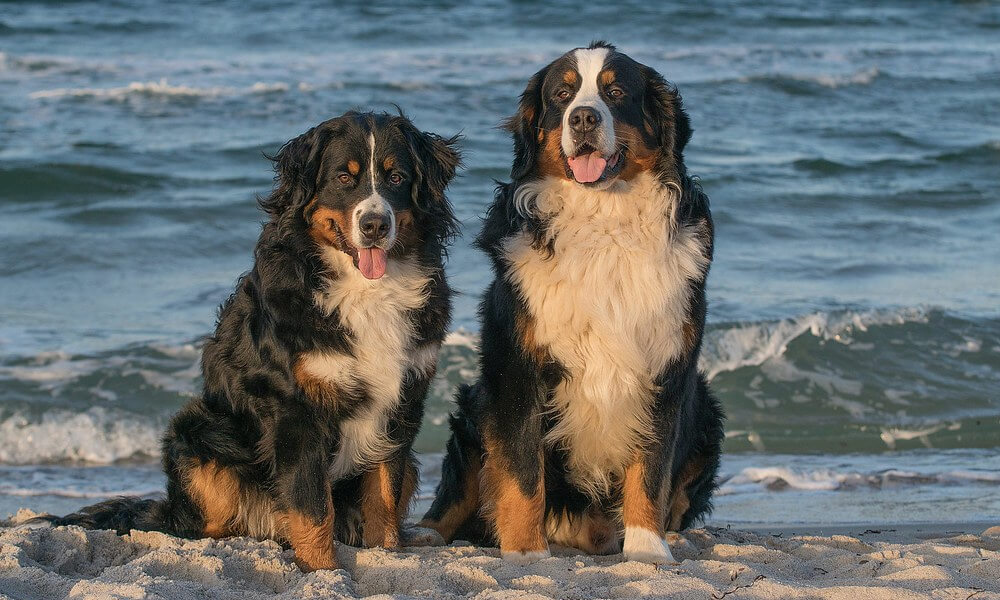
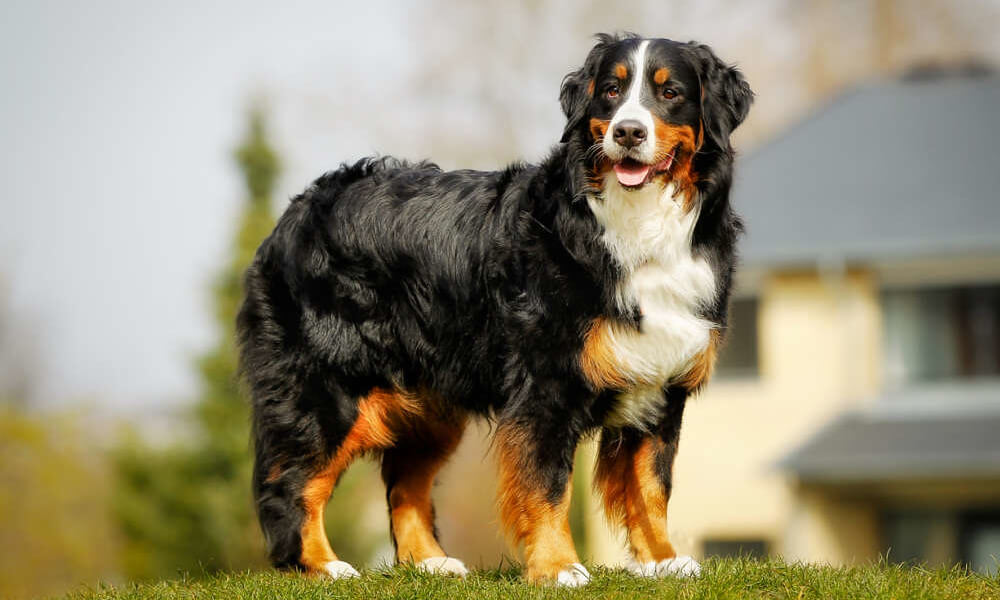
How to Take Care of Pet Bernese Mountain Dog?
Taking care of a Bernese Mountain Dog requires dedication and attention to their specific needs. These gentle giants thrive on love and companionship, so be prepared to provide them with plenty of affection and quality time. Their loyal and friendly nature makes them wonderful family pets, but they also require regular exercise and grooming to keep them healthy and happy. When it comes to caring for a Bernese Mountain Dog, here are some key aspects to consider:
How to Set Up a Habitat for a Pet Bernese Mountain Dog?
If you have a Bernese Mountain Dog as a pet, it is important to provide them with a suitable habitat that meets their needs. Here are some things to consider when setting up a habitat for a Bernese Mountain Dog:
- Size: Bernese Mountain Dogs are large dogs and need plenty of space to move around and exercise. Make sure that your home and yard are large enough to accommodate them.
- Shelter: Bernese Mountain Dogs need a place to retreat to when they want to rest or escape from the elements. A doghouse or a designated area in your home, such as a crate or a room, can provide them with the shelter they need.
- Exercise: Bernese Mountain Dogs are active dogs and need regular exercise to stay healthy and happy. Make sure that they have access to a yard or other area where they can run and play.
What to Feed Your Pet Bernese Mountain Dog?
Bernese Mountain Dogs are large, active dogs that need a diet that is formulated specifically for their size and energy needs. Here are some things to consider when selecting a diet for your Bernese Mountain Dog:
- Quality: Look for a high-quality commercial dog food that is made with whole, natural ingredients and does not contain fillers or artificial additives.
- Protein: Bernese Mountain Dogs need a diet that is high in protein to support their strong muscles and active lifestyle. Look for a food that is made with real meat, such as chicken, beef, or lamb, as the first ingredient.
- Fat: Bernese Mountain Dogs also need a diet that is high in fat to provide them with energy and to support healthy skin and coats. Look for food that contains healthy fats, such as those found in fish or flaxseed oil.
- Carbohydrates: Bernese Mountain Dogs need a diet that is low in carbohydrates to help prevent obesity and other health problems. Look for a food that is made with complex carbs, such as sweet potatoes or brown rice, rather than simple carbs like corn or wheat.
- Supplements: Depending on your dog's specific needs, you may want to consider adding supplements to their diet. For example, dogs with joint problems may benefit from a supplement that contains glucosamine, while dogs with allergies may benefit from a supplement that contains omega-3 fatty acids. Consult with a veterinarian or a nutritionist to determine if supplements are appropriate for your dog.
Feed your Bernese Mountain Dog a diet that is appropriate for their size, age, and activity level. Consult with a veterinarian or a nutritionist to determine the best diet for your dog.
What to Avoid Feeding Your Pet Bernese Mountain Dog?
There are certain things that you should avoid feeding your Bernese Mountain Dog to help keep them healthy and happy. Here are some things to avoid:
- Human food: Many human foods can be toxic to dogs or can cause digestive problems. Avoid feeding your Bernese Mountain Dog things like chocolate, grapes, raisins, onions, and garlic, as these can be poisonous to dogs.
- Bones: Although bones may seem like a natural choice for a dog to chew on, they can be dangerous for Bernese Mountain Dogs. Cooked bones can splinter and cause blockages or tears in the digestive tract, while large bones can cause choking.
- Excess treats: While it is okay to give your Bernese Mountain Dog the occasional treat, it is important not to overdo it. Treats should make up only a small portion of their diet, as excess treats can lead to obesity and other health problems.
- Table scraps: Avoid feeding your Bernese Mountain Dog table scraps or leftovers, as these can disrupt their diet and lead to digestive problems.
- Excess fat: While fat is an important part of a Bernese Mountain Dog's diet, it is important not to overdo it. Excess fat can lead to obesity and other health problems, such as pancreatitis.
Brushing, Bathing & Grooming Needs of Your Pet Bernese Mountain Dog
Bernese Mountain Dogs have a long, thick coat that requires regular grooming to keep it looking its best. Here are some things to consider when caring for your Bernese Mountain Dog's coat:
- Brushing: Bernese Mountain Dogs should be brushed at least once a week to prevent matting and to remove loose hair. Use a slicker brush or a comb to work through the coat, paying extra attention to areas that are prone to tangles, such as behind the ears and under the legs.
- Bathing: Bernese Mountain Dogs should be bathed every 3-4 months or as needed, using a dog-specific shampoo. Avoid getting water in their ears and be sure to rinse thoroughly to prevent skin irritation.
- Trimming nails: It is important to keep your Bernese Mountain Dog's nails trimmed to prevent them from getting too long and causing discomfort or problems with walking. If you are not comfortable doing this yourself, you can have a veterinarian or a groomer do it for you.
- Cleaning ears: Bernese Mountain Dogs are prone to ear infections, so it is important to check their ears regularly for signs of redness, swelling, or discharge. Use a veterinarian-approved ear cleaner to gently clean the ears as needed.
- Brushing teeth: It is important to brush your Bernese Mountain Dog's teeth regularly to prevent dental problems. Use a veterinarian-approved toothpaste and a soft-bristled toothbrush to brush their teeth at least once a week.
By providing regular grooming and care for your Bernese Mountain Dog's coat and teeth, you can help keep them looking and feeling their best. If you are not comfortable handling these tasks yourself, you can have a veterinarian, or a groomer do them for you.
Health Concerns of Pet Bernese Mountain Dogs
Bernese Mountain Dogs are generally healthy dogs, but like all breeds, they are prone to certain health issues. Here are some common health concerns to be aware of:
- Hip dysplasia: This is a common condition in which the hip joint does not form properly, leading to pain and difficulty moving.
- Elbow dysplasia: This is a similar condition that affects the elbow joint.
- Cancer: Bernese Mountain Dogs are prone to certain types of cancer, such as mammary cancer and lymphoma.
- Bloat: This is a serious condition in which the stomach becomes enlarged and twisted, leading to difficulty breathing and pain.
- Osteochondrosis: This is a condition that affects the growth plates in the bones, leading to pain and difficulty moving.
- Hypothyroidism: This is a condition in which the thyroid gland does not produce enough hormones, leading to weight gain, fatigue, and other health problems.
- Neoplasia: Neoplasia refers to the formation of abnormal and uncontrolled growths (tumors) in Bernese Mountain Dogs, which may be benign or malignant and require veterinary attention.
- Renal Failure and Kidney Disease: Renal failure and kidney disease can occur in Bernese Mountain Dogs, leading to impaired kidney function and potential health complications. Veterinary care and monitoring are crucial for early detection and management.
- Von Willebrand's Disease: Von Willebrand's disease is a genetic bleeding disorder in Bernese Mountain Dogs caused by a deficiency of von Willebrand factor, which helps with blood clotting. Veterinary attention is necessary.
- Progressive Retinal Atrophy (PRA): Progressive Retinal Atrophy (PRA) is a genetic eye disease that affects Bernese Mountain Dogs, leading to gradual degeneration of the retina and eventual vision loss.
To help prevent these health issues, it is important to keep your Bernese Mountain Dog at a healthy weight, provide them with regular exercise and a balanced diet, and visit the veterinarian regularly for check-ups and screenings. Early detection and treatment of health issues can help improve your dog's quality of life and extend their lifespan.
Training and Playing with Pet Bernese Mountain Dog
Bernese Mountain Dogs are intelligent, loyal, and eager to please, so they are generally easy to train. Here are some tips for training and playing with your Bernese Mountain Dog:
- Start training early: It is important to start training your Bernese Mountain Dog as soon as possible, ideally when they are still a puppy. This will help them learn basic obedience commands and good manners, and it will also help strengthen the bond between you and your dog.
- Use positive reinforcement: Bernese Mountain Dogs respond well to positive reinforcement, such as treats, praise, and affection. Use these rewards to encourage good behavior and to help your dog learn new commands.
- Be consistent: It is important to be consistent when training your Bernese Mountain Dog. Use the same commands and reward them for good behavior every time to help them understand what is expected of them.
- Provide plenty of exercise: Bernese Mountain Dogs are active dogs and need plenty of exercise to stay healthy and happy. Take them for walks, runs, or hikes, or play fetch or other interactive games with them to help them get the exercise they need.
- Socialize them: Bernese Mountain Dogs are social animals and benefit from regular interactions with other dogs and people. Take them to the park or to a dog-friendly beach, or enroll them in a obedience class or a dog sport to help them socialize and learn new skills.
What It's Like to Keep Bernese Mountain Dog as a Pet?
The Bernese Mountain Dog is a large and gentle breed known for its friendly nature, striking appearance, and strong work ethic. Here's what it's like to have a Bernese Mountain Dog as a pet:
Temperament: Bernese Mountain Dogs are known for their calm and gentle temperament. They are typically friendly, affectionate, and patient, making them excellent family pets. They are social dogs that usually get along well with children and other animals. They thrive on companionship and enjoy being part of the family.
Activity Level: While Bernese Mountain Dogs are a large breed, they have a moderate activity level. They enjoy daily walks, playtime, and the opportunity to stretch their legs in a securely fenced yard. They are not typically high-energy dogs, but they still benefit from regular exercise to maintain their physical and mental well-being.
Family Companion: Bernese Mountain Dogs are known for their love and loyalty towards their families. They thrive on being close to their owners and enjoy participating in family activities. They are typically good with children and can be excellent companions for households looking for a gentle and loving dog.
Other Pets to Keep or Avoid with Bernese Mountain Dogs
Bernese Mountain Dogs are generally good with other animals and can get along well with other dogs, cats, and even small pets such as rabbits and guinea pigs. However, it is important to introduce any new animal slowly and to supervise their interactions until you are sure that they are comfortable with each other.
Bernese Mountain Dogs are large, powerful dogs and may be too rough or energetic for smaller or more delicate animals. It is important to be mindful of this and to provide plenty of supervision and training to help them learn how to behave around other pets.
If you have a Bernese Mountain Dog and are considering getting another pet, it is important to consider the personality and needs of both animals and to make sure that they are a good match. It may also be helpful to consult with a veterinarian or a professional trainer for advice on introducing new pets to your household.
Facts About Bernese Mountain Dogs
Here are some interesting facts about Bernese Mountain Dogs:
- Gentle and Affectionate Nature: Bernese Mountain Dogs are known for their gentle and loving temperament. They are loyal and devoted to their families, including children, making them excellent family pets. They often form strong bonds with their owners and enjoy being close to them. Berners are generally good-natured and are typically friendly toward strangers and other animals when properly socialized.
- Working Heritage: As working dogs, Bernese Mountain Dogs have a strong work ethic and a willingness to please. They excel in various activities and jobs, including obedience training, cart pulling, therapy work, and even search and rescue operations. Their intelligence and versatility make them trainable, but they may require patience and consistency in their training due to their independent nature.
- Moderate Energy Level: While Bernese Mountain Dogs are active and enjoy outdoor activities, they have a moderate energy level compared to some other breeds. They benefit from daily exercise, such as walks, playtime, and mental stimulation. However, it's important not to overexert them, especially in hot weather, as they are sensitive to heat due to their thick coat.
- Natural Guardian Instincts: Berners have a natural guarding instinct and may exhibit protective behavior towards their families and homes. While they are not typically aggressive, they may bark to alert their owners to potential threats. Proper socialization and training from an early age can help them differentiate between genuine threats and normal situations.
- Symbol of Swiss Tradition: Bernese Mountain Dogs are considered a national symbol of Switzerland and are a part of the country's cultural heritage. They are often associated with the Swiss Alps and are celebrated for their loyalty, strength, and beauty.
Frequently Asked Questions About Bernese Mountain Dog
Here are some frequently asked questions about Bernese Mountain Dogs:
Are Bernese Mountain Dogs good with children?
Yes, Bernese Mountain Dogs are generally good with children and make great pets for families. They are affectionate and gentle with children and are known to be patient and good-natured. However, it is important to always supervise any interactions between children and dogs, and to teach children to respect the dog's boundaries.
Are Bernese Mountain Dogs good apartment dogs?
While Bernese Mountain Dogs are a large breed and typically do best in a home with a yard, they can do well in an apartment or other urban setting as long as they get enough exercise. It is important to provide them with regular walks and other opportunities to exercise, such as playing fetch or going for runs.
Are Bernese Mountain Dogs easy to train?
Bernese Mountain Dogs are intelligent and eager to please, so they are generally easy to train. However, they can be stubborn at times, so it is important to be consistent and patient when training them. They also benefit from regular socialization and interactions with other dogs and people.
How much exercise do Bernese Mountain Dogs need?
Bernese Mountain Dogs are a large, active breed and need plenty of exercise to stay healthy and happy. It is important to provide them with regular walks, runs, or hikes, and to give them the opportunity to play interactive games such as fetch. They should have at least an hour of exercise per day, but more may be needed depending on their age and energy level.

